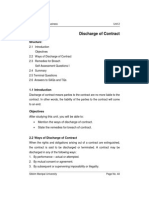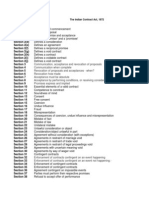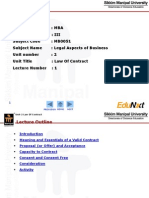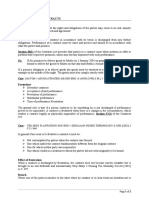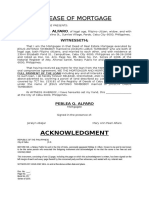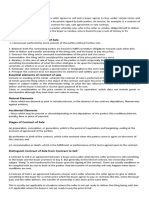0 ratings0% found this document useful (0 votes)
42 viewsAmity Law School Weekly Progress Report (WPR) - 3: For THIRD Week
Amity Law School Weekly Progress Report (WPR) - 3: For THIRD Week
Uploaded by
Lakshay TewatiaThis weekly progress report summarizes Lakshay Tewatia's work in an online Law of Contracts certificate course. [1] Lakshay studied various types of void agreements under Indian contract law. [2] He learned about wagering contracts and contingent contracts. [3] Lakshay also covered the obligations of parties to a contract, discharge of contracts, and grounds for frustration of contracts, including destruction of subject matter and change of circumstances. His future work will focus on breach of contract and available remedies.
Copyright:
© All Rights Reserved
Available Formats
Download as DOCX, PDF, TXT or read online from Scribd
Amity Law School Weekly Progress Report (WPR) - 3: For THIRD Week
Amity Law School Weekly Progress Report (WPR) - 3: For THIRD Week
Uploaded by
Lakshay Tewatia0 ratings0% found this document useful (0 votes)
42 views2 pagesThis weekly progress report summarizes Lakshay Tewatia's work in an online Law of Contracts certificate course. [1] Lakshay studied various types of void agreements under Indian contract law. [2] He learned about wagering contracts and contingent contracts. [3] Lakshay also covered the obligations of parties to a contract, discharge of contracts, and grounds for frustration of contracts, including destruction of subject matter and change of circumstances. His future work will focus on breach of contract and available remedies.
Original Title
WPR3
Copyright
© © All Rights Reserved
Available Formats
DOCX, PDF, TXT or read online from Scribd
Share this document
Did you find this document useful?
Is this content inappropriate?
This weekly progress report summarizes Lakshay Tewatia's work in an online Law of Contracts certificate course. [1] Lakshay studied various types of void agreements under Indian contract law. [2] He learned about wagering contracts and contingent contracts. [3] Lakshay also covered the obligations of parties to a contract, discharge of contracts, and grounds for frustration of contracts, including destruction of subject matter and change of circumstances. His future work will focus on breach of contract and available remedies.
Copyright:
© All Rights Reserved
Available Formats
Download as DOCX, PDF, TXT or read online from Scribd
Download as docx, pdf, or txt
0 ratings0% found this document useful (0 votes)
42 views2 pagesAmity Law School Weekly Progress Report (WPR) - 3: For THIRD Week
Amity Law School Weekly Progress Report (WPR) - 3: For THIRD Week
Uploaded by
Lakshay TewatiaThis weekly progress report summarizes Lakshay Tewatia's work in an online Law of Contracts certificate course. [1] Lakshay studied various types of void agreements under Indian contract law. [2] He learned about wagering contracts and contingent contracts. [3] Lakshay also covered the obligations of parties to a contract, discharge of contracts, and grounds for frustration of contracts, including destruction of subject matter and change of circumstances. His future work will focus on breach of contract and available remedies.
Copyright:
© All Rights Reserved
Available Formats
Download as DOCX, PDF, TXT or read online from Scribd
Download as docx, pdf, or txt
You are on page 1of 2
AMITY LAW SCHOOL
WEEKLY PROGRESS REPORT (WPR) – 3
For THIRD week
Enrolment No. – A3221519221
Program –B.B.A. L.L.B. (Hons)
Batch - 2019 - 2024
Student Name – LAKSHAY TEWATIA
Faculty Guide’s Name – Dr. Anil Kumar Sinha
Project Title:
LAW OF CONTRACTS (Online Certificate Course)
Targets set for the week:
Void Agreements, Wagering, Contingent, Quasi and Performance of Contracts, Discharge of
contract, Ground of Frustration
Progress/Achievements for the week:
Void agreements [section 2(g)] – “an agreement not enforceable by law is said to be void.” The
agreements which have declared void by the Act are as follows:-
(1) Agreements of which consideration and objects are unlawful in part (section 24)
(2) Agreements without consideration (section 25)
(3) Agreements in restraint of marriage (section 26)
(4) Agreement in restraint of trade (section 27)
(5) Agreement in restraint of legal proceedings (section 28)
(6) Agreement void for uncertainty (section 29)
(7) Agreement by way of wager (section 30)
(8) Agreement to do an Impossible Act (section 56).
Wagering contract - A wagering contract is one by which two persons professing to hold
opposite views touching the issue of a future uncertain event, mutually agree that dependant
upon the determination of that event, or shall win from the other, and that other shall pay or hand
over to him, a sum of money on other stakes, neither of the contracting parties having any other
interest in that contract than the sum or stake he will so win or lose, there being no other real
consideration for the making of such contract by either of parties.
Contingent Contract[Section 31] – A contingent contract is a contract to do or not to do
something, if some event collateral to such contract does or does not happen.
Obligation of parties to contract [Section 37] - The parties to a contract must either perform,
offer to perform, their respective promises unless such performance is dispensed with or
executed under the provision of this Act, or of any other law. Promises bind the representatives
of the promisors in case of the death of such promisors before performance, unless a contrary
intention appears from the contract.
DISCHARGE OF CONTRACT
1. Agreement to do Impossible Act. [Section 56]
2. Contract to do act afterwards becoming impossible or unlawful [Section 57]
3. Compensation for loss though non-performance of act known to be impossible or
unlawful. [Section 58]
Grounds of Frustration – The principle of frustration of contract or of the impossibility of
performance is applicable to a great variety of contract. The following ground of frustration are:
1. Destruction of Subject- matter
2. Change of Circumstances
3. Non-occurrence of Contemplated Event
3. Non-occurrence of Contemplated Event
Future Work Plans:
To know about Breach of Contract and Remedies
Regards
Lakshay Tewatia
You might also like
- Unilaterally Termination For ConvenienceDocument11 pagesUnilaterally Termination For ConvenienceZinck Hansen100% (1)
- Rent AgreementDocument109 pagesRent AgreementShunna BhaiNo ratings yet
- Aspects of Contract and Negligence For BusinessDocument13 pagesAspects of Contract and Negligence For BusinessNighat Imran82% (11)
- MistakeDocument8 pagesMistakemgtduNo ratings yet
- The Indian Contract Act, 1872Document25 pagesThe Indian Contract Act, 1872Manish KumarNo ratings yet
- Restraining Legal ProceedingDocument12 pagesRestraining Legal ProceedingheretostudyNo ratings yet
- Unit 2 Discharge of Contract: StructureDocument17 pagesUnit 2 Discharge of Contract: StructuregaardiNo ratings yet
- Indian Contract Act 1872Document4 pagesIndian Contract Act 1872Kaushik NarayananNo ratings yet
- Law of Contract Assignment 2Document8 pagesLaw of Contract Assignment 2Aminesh Gogoi100% (1)
- Recession of ContractsDocument10 pagesRecession of ContractsVarun Oberoi100% (3)
- Assignment Indian ConTRACT ACTDocument2 pagesAssignment Indian ConTRACT ACTbijuprasad0% (1)
- Project On Law On Void AgreementgsDocument12 pagesProject On Law On Void AgreementgsVarun AgarwalNo ratings yet
- Agreements Which Restrain Legal ProceedingsDocument12 pagesAgreements Which Restrain Legal ProceedingsRavishankar Pandey 007No ratings yet
- Law of Contract Nature of ContractDocument6 pagesLaw of Contract Nature of ContractChaitu Un PrediCtbleNo ratings yet
- Discharge of A ContractDocument14 pagesDischarge of A ContractAreeb AsifNo ratings yet
- Discharge of Contract by AgreementDocument10 pagesDischarge of Contract by AgreementEbsa IsayasNo ratings yet
- Performance Discharge & Breach of ContractDocument6 pagesPerformance Discharge & Breach of ContractHasin Jawad Ali 200061107No ratings yet
- Essentials of A Valid Contract:: 1) Offer & Acceptance 2) Intention To Create Legal RelationshipDocument13 pagesEssentials of A Valid Contract:: 1) Offer & Acceptance 2) Intention To Create Legal RelationshipAnkit BajajNo ratings yet
- 6discharge of ContractsDocument10 pages6discharge of ContractsVaibhav AhujaNo ratings yet
- Void and Voidable AgreementDocument6 pagesVoid and Voidable AgreementMohandas Periyasamy100% (1)
- Sec 1 To 76Document9 pagesSec 1 To 76basitalee81No ratings yet
- Doctrine of Subsequent Impossibility-The Second Paragraph of Section 56 Lays Down TheDocument8 pagesDoctrine of Subsequent Impossibility-The Second Paragraph of Section 56 Lays Down TheraffeyroyNo ratings yet
- The Indian Contract ActDocument3 pagesThe Indian Contract Actakashhawk3No ratings yet
- Malaysia Contracts Act 1950Document5 pagesMalaysia Contracts Act 1950jycheahNo ratings yet
- Businesslaw 1Document15 pagesBusinesslaw 1beingaaditya02No ratings yet
- Notes - Introduction To FIDIC ContractsDocument13 pagesNotes - Introduction To FIDIC Contractsgptfour2023No ratings yet
- Indian Contract Act 1872 Contd.....Document57 pagesIndian Contract Act 1872 Contd.....Richa GoelNo ratings yet
- Validity of Contract: BBA-LLB (H) / Semester-1Document10 pagesValidity of Contract: BBA-LLB (H) / Semester-1AbigalNo ratings yet
- Business Regulations Notes: Elements of A ContractDocument19 pagesBusiness Regulations Notes: Elements of A ContractFa DreamsNo ratings yet
- Discharge of ContractDocument4 pagesDischarge of Contractgoon baboonNo ratings yet
- Rescission of Contracts - 1Document12 pagesRescission of Contracts - 1Chudap Cell Inc.No ratings yet
- Indian Contract Act 1872 Sections 1 To 75Document5 pagesIndian Contract Act 1872 Sections 1 To 75Krushnal PatilNo ratings yet
- CORPORATE LAW UNIT-1 HWDocument5 pagesCORPORATE LAW UNIT-1 HWM K QureshiNo ratings yet
- Lab Unit 2Document13 pagesLab Unit 2sandeepsankar369No ratings yet
- Void Agreements: Example: Suppose, Jimmy Offers David (Minor) To Supply 1000 KG of Wheat For Rs 20000, at ADocument11 pagesVoid Agreements: Example: Suppose, Jimmy Offers David (Minor) To Supply 1000 KG of Wheat For Rs 20000, at AAqib LatifNo ratings yet
- Discharge of ContractDocument20 pagesDischarge of ContractUtkarsh SethiNo ratings yet
- Void and Voidable AgreementDocument7 pagesVoid and Voidable AgreementDhiraj YuvrajNo ratings yet
- Sections of ICADocument5 pagesSections of ICAcaaspangauriyaNo ratings yet
- DischargeDocument69 pagesDischargeJoseph JohnNo ratings yet
- Module 5Document8 pagesModule 5Chetanya KapoorNo ratings yet
- Rescission of ContractsDocument5 pagesRescission of ContractsChudap Cell Inc.No ratings yet
- Assignment On Breach of ContractDocument12 pagesAssignment On Breach of ContractKamaku SoftNo ratings yet
- Business Law Sem 1Document51 pagesBusiness Law Sem 1Aritra KunduNo ratings yet
- Laws of Indian Contract Act - A Detailed ExplanationDocument9 pagesLaws of Indian Contract Act - A Detailed ExplanationSMART TECHNo ratings yet
- Contract Presentation Group 3Document9 pagesContract Presentation Group 3ifeanaonwukosisoNo ratings yet
- AU-7058 Law of Contract 10.12.14Document4 pagesAU-7058 Law of Contract 10.12.14jyothi jyothiNo ratings yet
- Program: Mba Semester: Iii Subject Code: MB0051 Subject Name: Legal Aspects of Business Unit Number: 2 Unit Title: Law of Contract Lecture Number: 1Document26 pagesProgram: Mba Semester: Iii Subject Code: MB0051 Subject Name: Legal Aspects of Business Unit Number: 2 Unit Title: Law of Contract Lecture Number: 1Meeka SinghalNo ratings yet
- Void and Voidable AgreementDocument11 pagesVoid and Voidable AgreementSiddharth MewaraNo ratings yet
- Lecture 14Document5 pagesLecture 14adeelkhan17.akNo ratings yet
- Discharge of Contracts SummaryDocument2 pagesDischarge of Contracts SummaryRamani Krishnamoorthy0% (1)
- University Institute of Legal Studies Panjab University, ChandigarhDocument15 pagesUniversity Institute of Legal Studies Panjab University, Chandigarhaartii singhNo ratings yet
- Discharge of A ContractDocument27 pagesDischarge of A Contractshreeya salunke100% (1)
- Contract I (1) - 240110 - 115736Document39 pagesContract I (1) - 240110 - 115736sachindevllbNo ratings yet
- Discharge of ContractDocument16 pagesDischarge of ContractUtkarsh Patel100% (2)
- Agreement Declared To Be VoidDocument32 pagesAgreement Declared To Be VoidAnirudh ChaturvediNo ratings yet
- Discharge by Agreement of Contract (Contract-1)Document19 pagesDischarge by Agreement of Contract (Contract-1)Divyansh Sharma0% (1)
- Void ContractsDocument7 pagesVoid ContractsrahulNo ratings yet
- Unit-3 NotesDocument4 pagesUnit-3 NotesTruptiNo ratings yet
- Contract Law Specific Relief ActDocument9 pagesContract Law Specific Relief ActLeina Suren100% (2)
- Soccer (Football) Contracts: An Introduction to Player Contracts (Clubs & Agents) and Contract Law: Volume 2From EverandSoccer (Football) Contracts: An Introduction to Player Contracts (Clubs & Agents) and Contract Law: Volume 2No ratings yet
- Understanding Named, Automatic and Additional Insureds in the CGL PolicyFrom EverandUnderstanding Named, Automatic and Additional Insureds in the CGL PolicyNo ratings yet
- Comlaw Prequalifying SolManDocument10 pagesComlaw Prequalifying SolManAnj SueloNo ratings yet
- Contract Performance Guarante TemplateDocument3 pagesContract Performance Guarante TemplateJoko PrasetyoNo ratings yet
- A Project Report ON Concept of Lease and Its ForfeitureDocument15 pagesA Project Report ON Concept of Lease and Its ForfeitureAnonymous Jbpvd8PoNo ratings yet
- Obligation and ContractsDocument15 pagesObligation and ContractsnicoleNo ratings yet
- 10 Day Notice To Move Out EarlyDocument1 page10 Day Notice To Move Out EarlyHafsa AbbasiNo ratings yet
- Contract ProjectDocument15 pagesContract ProjectRohish MehtaNo ratings yet
- Lease Contract Simple VersDocument2 pagesLease Contract Simple VersJMNo ratings yet
- CONTRACT OF LEASE Jing IyaDocument4 pagesCONTRACT OF LEASE Jing IyaAimee De GuzmanNo ratings yet
- Teodoro Acap vs. Ca G.R. No. 118114 December 7, 1995Document3 pagesTeodoro Acap vs. Ca G.R. No. 118114 December 7, 1995Florienne MelendrezNo ratings yet
- Form of Contracts: General RuleDocument50 pagesForm of Contracts: General RuleMikMik Uy0% (1)
- Below, But Caught My Error in Time.) : Landlord's Breach of The Cov of Quiet EnjoymentDocument1 pageBelow, But Caught My Error in Time.) : Landlord's Breach of The Cov of Quiet EnjoymentStavros PapadopoulosNo ratings yet
- Mid Assignment BUS-502 PDFDocument9 pagesMid Assignment BUS-502 PDFhania sultanaNo ratings yet
- Estate of K. H. Hemady vs. Luzon Surety Co., Inc. G.R. No. L-8437, 28 November 1956Document2 pagesEstate of K. H. Hemady vs. Luzon Surety Co., Inc. G.R. No. L-8437, 28 November 1956Bibi Jumpol67% (3)
- Essential Elements of The Valid Contract (Basic Principles) - InfraDocument7 pagesEssential Elements of The Valid Contract (Basic Principles) - InfraVishalNo ratings yet
- Release of MortgageDocument2 pagesRelease of MortgageroginNo ratings yet
- Jhabvala ContractsDocument223 pagesJhabvala Contractsshrye doshiNo ratings yet
- ABG预付款保函格式参考GC1901921000094 R1Document3 pagesABG预付款保函格式参考GC1901921000094 R1Shilpa GaikwadNo ratings yet
- Important Circumstances Under Which A Surety Is Discharged From His Liability Are Given BelowDocument15 pagesImportant Circumstances Under Which A Surety Is Discharged From His Liability Are Given BelowPriyankaJain100% (1)
- QuitDocument4 pagesQuitcaleb ebongNo ratings yet
- Contract of Lease LISI PHILIPPINESDocument4 pagesContract of Lease LISI PHILIPPINESMoujeck Olayvar CabalesNo ratings yet
- Contract of Lease - Omadle (Lease For Lott)Document2 pagesContract of Lease - Omadle (Lease For Lott)rjpogikaayoNo ratings yet
- Mancor-5-Mid - Lecture-MaterialDocument20 pagesMancor-5-Mid - Lecture-MaterialAerika Delos SantosNo ratings yet
- Contract of SalesDocument3 pagesContract of SalesJoyce TenorioNo ratings yet
- Blaw AssignmentDocument1 pageBlaw Assignmentps4gamesps421No ratings yet
- Chartering - Module 1Document141 pagesChartering - Module 1Biswajit MalakarNo ratings yet
- Si Paper 18 Aug Shift 2 Paper 2Document15 pagesSi Paper 18 Aug Shift 2 Paper 2jattNo ratings yet
- Loan Agreement: This Draft of 'Document3 pagesLoan Agreement: This Draft of 'Rahul SinghNo ratings yet
- The MERS Project - Mortgage Banking, June 1995-Phyllis K SlesingerDocument4 pagesThe MERS Project - Mortgage Banking, June 1995-Phyllis K SlesingerTim BryantNo ratings yet
- Reviewed Rental Agreement AnkitDocument7 pagesReviewed Rental Agreement AnkitVinay Kumar GowdaNo ratings yet






